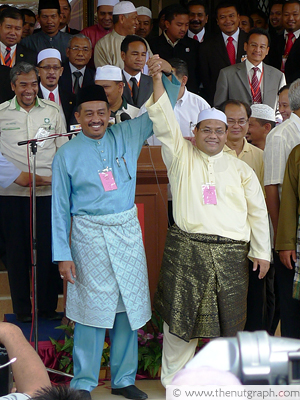
BARISAN Nasional is banking on Umno veteran Tengku Razaleigh Hamzah‘s star power to win the Galas by-election. The Kelantan prince, fondly known as Ku Li, was appointed to lead the BN’s campaign because of his popularity among Gua Musang constituents, and his much-respected authority. Indeed, Ku Li’s persona eclipses that of the two candidates themselves, Umno Gua Musang division secretary Abdul Aziz Yusof, 49, and PAS’s Dr Zulkefli Mohamed, 44.
Ku Li has been the Member of Parliament for Gua Musang since 1974. He has a faithful core of voters who followed him when he left Umno to form Semangat 46, and who continued to vote for him even when he re-joined Umno. In fact, even though he is not the candidate, the by-election is seen by some as a contest between two towering personalities — Ku Li and PAS spiritual leader Datuk Seri Nik Abdul Aziz Nik Mat.
However, is this really the sentiment on the ground among voters? A look at past election results, too, reveals that Ku Li may not be as popular as touted. Putting aside Ku Li’s personal appeal, and taking into account that the Malay Malaysian vote is split between Umno and PAS, a swing in the Chinese Malaysian or Orang Asli votes could likely determine the by-election results.
Just how popular?
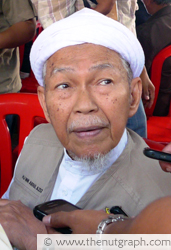
“Everyone in this kampung used to love Ku Li, we supported him even went he left Umno to form Semangat 46, but we [felt] betrayed when he rejoined Umno, so many of us now support Tok Guru (Nik Aziz),” says a Kampung Tiong resident only willing to be known as Ramli.
Such sentiment corresponds with the 1999 election results. Ku Li, who ran for the parliamentary seat, received 2% fewer votes in Galas compared to the state candidate at that time, political analyst Dr Ong Kian Ming points out.
“If he was really as popular as claimed, then he should have received more votes than the state candidate,” Ong tells The Nut Graph in a phone interview.
The UCSI lecturer adds that in the 2008 general election, Ku Li only polled 47% of the votes in Galas. He won the Gua Musang parliamentary seat thanks to higher votes in the two other state seats of Paloh and Nenggiri.
Apart from that, Ku Li’s common stand with Pakatan Rakyat on Kelantan’s oil royalty also does not go down well with some local Umno supporters.
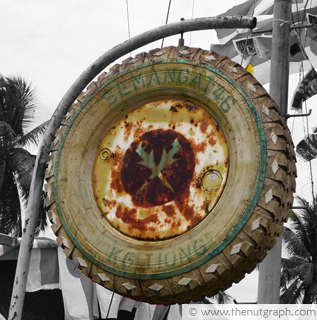
“He should wait for Umno to recapture Kelantan again [before criticising about the oil royalties],” a Gua Musang resident tells The Nut Graph during a mamak chat. Like most locals in close-knit rural communities, the resident is wary of being identified in the media when discussing politics.
However, another resident who also declined to be named thinks Ku Li is doing the right thing. “He spoke out for Kelantan while other Umno leaders remained silent,” the resident says.
Political analyst Dr Sivarumugan Pandian from Universiti Sains Malaysia believes many Malay Malaysian voters still support Ku Li as a personality.
“Ku Li has to bring back these voters if he wants to unite the Malay vote. He also has to win this election by hook or by crook because his political career is on the line,” says Dr Sivamurugan.
PAS’s silence on oil royalty
On the other hand, PAS has remained largely silent on the oil royalty issue in the first week of the campaign.
Kelantan PAS elections director Datuk Wan Abd Rahim Wan Abdullah denied on 29 Oct 2010 that his party had struck a deal with Ku Li to remain mum over the issue. Instead, he claimed that PAS lacked speakers who were well-versed on the topic.
Ong, however, feels that any politician should be able to talk about this issue on a political level.
“I suspect PAS is trying to play safe. They don’t want to play it up too much in case BN suddenly promises to return the oil royalty.
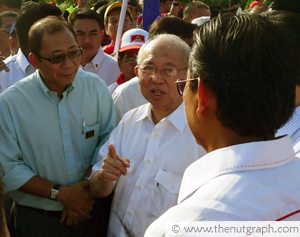
“Ku Li might also have something up his sleeves; he wouldn’t have agreed to lead this election without having extracted some promises from Najib. Maybe PAS got wind of this,” Ong speculates.
Sivamurugan also thinks that PAS will still need Ku Li as their expert witness in the ongoing oil royalty suit between Petronas and the Kelantan government.
“It doesn’t make a difference to PAS’s [power in the state government] whether they win or lose this state seat, but they definitely wouldn’t want to lose Ku Li’s support,” he says.
Merdeka Center for Opinion Research director Ibrahim Suffian says PAS may have evaluated the issue and thinks that it would not sway existing Malay Malaysian voters. This group is traditionally split almost evenly between Umno and PAS.
“If PAS assumes that the Chinese [Malaysian] and Orang Asli voters will be the deciding factors, they are more likely to focus on issues relevant to these communities instead,” Ibrahim tells The Nut Graph in a phone interview.
Chinese and Orang Asli votes
Without a strong DAP presence in this part of Kelantan, Chinese Malaysians, who comprise about 20% of voters in Galas, are traditionally either MCA or PAS supporters. Ibrahim notes that in 2008, the majority of Chinese voters opted for PAS.
Ong observes that in most by-elections since the 2008 general election, Chinese Malaysian voters have consistently sided with Pakatan Rakyat due to their increasing confidence in the coalition.
“I don’t see any difference in Galas, especially since the Chinese voters are living in a PAS-controlled state. I expect to see an increase in support for PAS,” he says. He adds that PAS’s advantage as the state government is that it can promise to resolve land title issues for the Chinese community and actually be able to deliver it.
As for the Orang Asli, they have been strong BN supporters traditionally. And many appear to be unhappy with the state government for allegedly taking away their ancestral lands under the state’s ‘Ladang Rakyat‘ programme. A swing to PAS in the Orang Asli vote is unlikely, unless the state suddenly promises to recognise their land rights and award them land titles accordingly.
Slow start
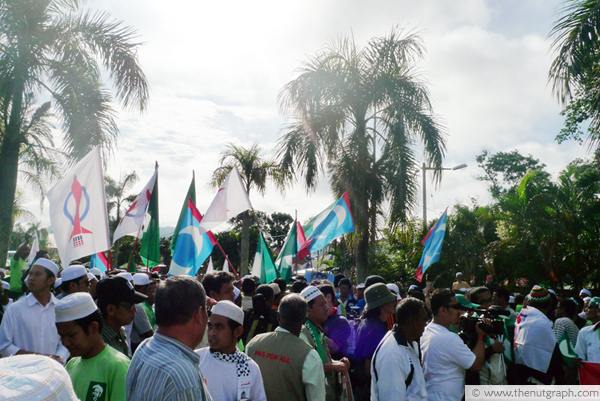
The race for Galas is a tight, and as yet unpredictable one. With both sides refraining from personal attacks and without major issues to harp on, the campaigning mood in Galas was mild during its first week.
However, Ong predicts that the election campaign could heat up before polling on 4 Nov. In addition, Ibrahim points out that the Galas-by election is especially significant for BN.
“Galas was traditionally a BN stronghold except in 2008. It is the kind of seat that BN would want to reclaim in the next general election. The result will forecast how they may fare in such marginal seats in the next elections,” Ibrahim concludes. ![]()

